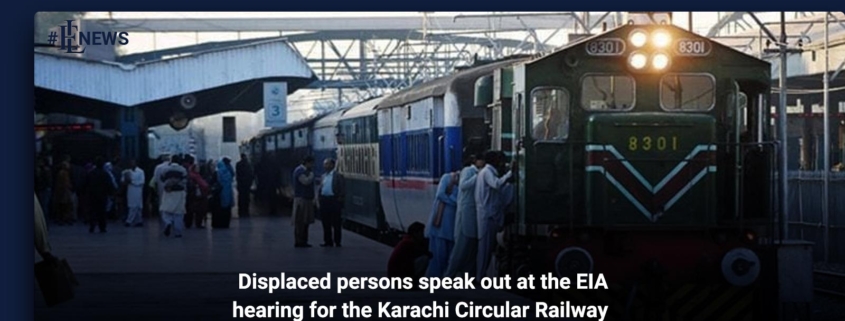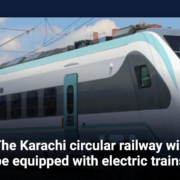Displaced persons speak out at the EIA hearing for the Karachi Circular Railway
At the EIA hearing for the Karachi Circular Railway project, displaced people air their grievances.
On Wednesday, a public hearing on the environmental impact assessment (EIA) report for the development of the Karachi Circular Railway (KCR) miserably failed to alleviate the concerns of the project’s affected residents. They turned out in large numbers and repeatedly demanded that the govt take quick measures for their resettlement and provide them with all utilities, as per the Supreme Court’s 2019 decision.
Sindh Environmental Protection Agency (Sepa) organized the event at Karachi Cantonment Railway Station.
The federal government’s development, operation, and maintenance of the Karachi Circular Railway as a modern urban railway through public-private partnerships are estimated to cost Rs207 billion and is expected to be completed in three years.
Several speakers expressed regret during the question-and-answer session that, while they expressed their support for the project, there was no mention of the KCR affectees’ grievances in the presentation on the EIA report made at the event.
A contract has been signed with KE for the supply of ‘uninterrupted’ electricity for train operation.
Expressed their frustration with the government’s delay in resettling them, project affected residents cited a Supreme Court decision dated May 9, 2019 ordering the government to resettle 1,100 people whose homes were demolished in Gulshan-i-Iqbal, Quaid-i-Azam Colony, Gharibabad, Punjabi Basti, Moosa Colony, and Mujahid Colony during the anti-encroachment drive to clear the KCR route.
The court ordered the government to provide them with all necessary utilities during their resettlement.
“Please have mercy on us!” Three years have passed with no visit from a single government official. Where are the poor to go? Some of us are living on the rubble of our destroyed homes, while others are forced to rent,” an elderly man who lost his home in Quaid-i-Azam Colony explained.
It’s difficult to explain how difficult it was to pay monthly rent while also managing necessities in the face of rising inflation.
A few participants recounted their ordeal when their homes were demolished during Ramadan in 2019, describing the government’s campaign to clear the 43.24-kilometer-long KCR as pure injustice.
“At the time, my wife was undergoing treatment for cancer. I was forced to seek refuge for her and my three small daughters. And it wasn’t just me who was up against an uphill battle. The government bulldozed hundreds of houses without warning,” another attendee, whose house was demolished seven months ago, explained, adding that the majority of KCR affected residents had lived in those neighborhoods for 50 to 60 years.
Read more with EL news : DHA Multan Property Expo 2021 in Karachi announced
Concerns about the use of contentious census data
Concerning the technical and legal aspects of the project, concerns were raised about the utility of sharing the EIA report with the general public while the project was already underway.
The EIA report, it was alleged, omitted information about the project’s impact on people and the environment and relied on contentious 2017 census data.
The news that electric trains would operate on the railway track sparked widespread scepticism. Concerns were also elaborated about the absence of Sepa’s director general and federal government representation, indicating participants’ desire for concrete assurances regarding their resettlement.
However, the project’s proponent could not provide the most recent data on the number of people impacted by the project.
In response, KCR Project Director Ameer Mohammad Daudpota discussed how the project would benefit commuters, stating that 25 trains would operate between 6 a.m. and 11 p.m. daily, transporting an estimated 475,000 riders.
The project would make use of the track’s existing length.
Concerning the affected parties, he stated, “We are aware of the issues that exist in our records. A grievance committee is included in the project, and the grievance process will be conducted following applicable law.”
Concerning electric trains, he stated that they had signed an agreement with K-Electric to ensure the project’s ‘uninterrupted electricity supplies.’
Sepa Deputy Director Imran Sabir explained that the KCR project’s initial environmental impact assessment was completed and approved in 2008-09. They continued the project in bits and pieces over the years. Following the Supreme Court’s intervention, the department requested that the railways upgrade the EIA report.
Earlier, a representative of EMC Pakistan Private Limited, environmental impact assessment consultants, gave a presentation on the EIA report, which stated that the project would alleviate Karachi’s traffic congestion and reduce airborne contaminants.
According to information shared during the programme, the KCR originates at Drigh Road station on the Pakistan Railways mainline and then passes through Gulistan-i-Johar, Gulshan-i-Iqbal, Liaquatabad, Nazimabad, SITE, Baldia, Lyari, Kharadar, and Mithadar before reaching the City Station.
Keep up with Estate Land Marketing for news and updates.






Leave a Reply
Want to join the discussion?Feel free to contribute!